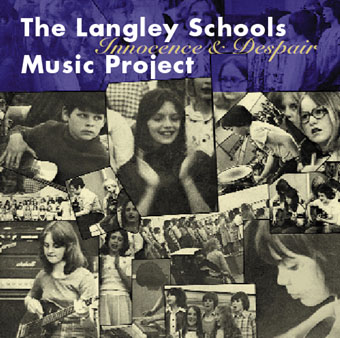
The Langley Schools Music Project - Innocence & Despair (2001)
Tracklist
01.- Venus and Mars/Rock Show (Paul McCartney &.Wings)
02.- Good Vibrations (The Beach Boys)
03.- God Only Knows (The Beach Boys)
04.- Space Oddity (David Bowie)
05.- The Long and Winding Road (The Beatles)
06.- Band On The Run (Paul McCartney & Wings)
07.- I'm Into Something Good (Earl-Jean/Herman's Hermits)
08.- In My Room (The Beach Boys)
09.- Saturday Night (Bay City Rollers)
10.- I Get Around (The Beach Boys)
11.- Mandy (Barry Manilow)
12.- Help Me, Rhonda (The Beach Boys)
13.- Desperado (The Eagles)
14.- You're So Good To Me (The Beach Boys)
15.- Sweet Caroline (Neil Diamond)
16.- To Know Him Is To Love Him (Teddy Bears)
17.- Rhiannon (Fleetwood Mac)
18.- You're Sixteen (Johnny Burnette/Ringo Starr)
19.- Little Deuce Coupe (The Beach Boys)
20.- Wildfire (Michael Martin Murphy)
21.- Calling Occupants of Interplanetary Craft (The Recognized Anthem of World Contact.Day) (Klaatu/The Carpenters)
En una escena de “Mi vida sin mi” de Isabel Coixet sonaba mi canción favorita de los Beach Boys (y una de mis canciones favoritas de todos los tiempos), “Good Only Knows”, en las voces de un coro de niños. Pensaba que era una versión nueva y busqué quienes eran esos angelicales cantantes. Resulta que, por edad, podrían ser mis padres. The Langley Schools Music Project es un coro de 60 voces de los niños de una escuela rural del oeste de Canadá, inexperimentados pero captivados por la magia de la melodia, cantando temas de The Beach Boys, Paul McCartney, David Bowie, The Bay City Rollers y otros. Los estudiantes se acompañan de carillones repicando percusión al estilo de Orff y de los arreglos rock elementales dispuestos por su profesor itinerante de música, Hans Fenger. Estas grabaciones de 1976-77, capturadas en una cinta 2 pistas en un gimnasio de la escuela, no fueron efectuadas para ganar dinero o fama ni para vender álbumes o para obtener un contrato. Estos chicos tocaban la música porque la amaban. Inocentes, dañadas y agridulces, guiadas por el insospechado genio de Fenger, estas grabaciones merecian ser oídas y preservadas. Las grabaciones fueron editadas originalmente en dos LPs de 12 pulgadas, premsados exclusivamente para los estudiantes, sus compañeros, profesores y padres. Nunca se intentó que fueran oidas fuera de la región provincial de Langley. Pero años después llamaronn la atención de Irwin Chusid, un productor musical que quiso hacer estas grabaciones comercialmente disponibles. Él forjó un acuerdo con los administradores de la escuela de Langley y, con la bendicion de Hans Fenger y varios solistas ex-estudiantes que fueron localizados, estas grabaciones inpagables se han hecho publicas para el resto del mundo.
Discografía The Langley Schools Music Project:
2001 Innocence & Despair
http://betterpropaganda.com/artist_page.asp?id=404
http://www.keyofz.com/keyofz/langley/
http://www.gammonrecords.com/artists/langley/bio.html
http://www.keyofz.com/keyofz/langley/
http://www.gammonrecords.com/artists/langley/bio.html

